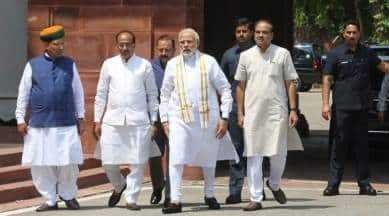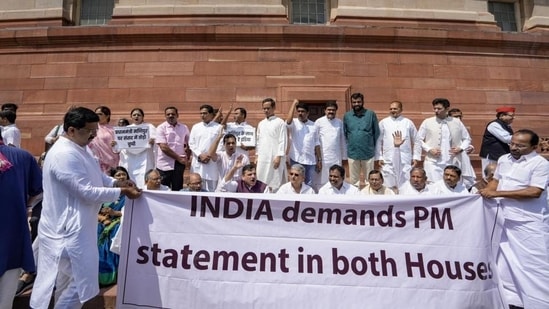Congress against the Narendra Modi:
The Lower House has voted to accept a no-confidence motion brought by the Congress against the Narendra Modi administration in an effort to put pressure on the BJP over the Manipur issue. The Lok Sabha Speaker, Om Birla, stated that he will address the situation with the floor leaders and set a date and time for the motion’s consideration.
Congress, the DMK, the TMC, the BRS, the NCP, the Shiv Sena (UBT), the JD(U), and the Left parties supported the motion notice that was proposed by Gaurav Gogoi, the deputy leader of the Congress in the Lok Sabha.
Nama Nageswar Rao of the Bharat Rashtra Samithi (BRS) had also introduced a no-confidence resolution against the government. The measure, in the opinion of a united Opposition, will force the Prime Minister to address the Manipur crisis on the House floor.
Gogoi stood up during the morning session of the House to announce that the no-confidence motion should be discussed since he had already given notice of it. The House then began to work, and Speaker Om Birla asked Gogoi to take his place. The Speaker informed Gogoi, “You are a seasoned MP and you are aware of the rules.”
Prime Minister Modi was requested to address the Lok Sabha on Manipur when the Congress and other leaders of the Opposition ran to the Well of the House during Birla’s Question Hour. They carried signs reading, “India for Manipur” and “Nafrat ke khilaf India ekjoot ho gaye (India is united against hatred)”.

As they protested the Ashok Gehlot administration, BJP MPs from Rajasthan stood up and waved red diaries. A few West Bengal-based BJP members could also be spotted shouting. Birla quickly called for a 40-minute break in the proceedings. Both Congress leader Sonia Gandhi and Union Home Minister Amit Shah were currently in the House.
Rao urged the House to consider the motion in accordance with rule 198 B of XVII of the Rules of Procedure and Conduct of Business in the Lok Sabha, much like Gogoi had done. The Speaker will announce the date to discuss the proposal once it has been approved by a minimum of 50 members in accordance with the rules.
The designated time must occur within 10 days of the day the motion is approved. If the motion is unsuccessful, the member who proposed it will be notified. Only six months after the Parliament has rejected a prior motion of no confidence may a new one be presented.
The BJP doesn’t seem to be phased by the objections from the opposition. Prime Minister Modi on Tuesday reportedly told his MPs to be steadfast in their attempts to bring the NDA government back to power in 2024 and not to be discouraged or distracted by the Opposition’s attack or their methods against the government, according to insiders in the ruling party.
Referring to the Opposition’s unsuccessful attempt at a similar move in the previous Lok Sabha, BJP officials said they were not concerned about the no-confidence motion. Leaders claimed that because the administration had so far been successful in advancing its legislative program, it was not very concerned about the disturbances in Parliament.
The Biological Diversity (Amendment) Bill, 2022, and the Constitution (Scheduled Tribes) Order (Fifth Amendment) Bill, 2022, were among the important bills that the government was able to approve on Tuesday in both the Lok Sabha and the Rajya Sabha.
The government introduced the National Nursing and Midwifery Commission Bill, 2023, the National Dental Commission Bill, 2023, and the Constitution (Scheduled Tribes) Order (Fifth Amendment) Bill, 2022 on Monday as well, when the Lok Sabha’s presiding officers at least partially allowed the Question Hour to function.
The opposition is still insisting that Prime Minister Modi make a statement on Manipur, rejecting the offer of Union Home Minister Amit Shah to hold a discussion, sources inside the opposition acknowledged some concern over the government passing the Bills through without debate.
A member of the opposition party voiced concern that they would be stepping into a trap set by the BJP and that the administration might only be too glad about the interruptions, ensuring no opposition to Bills having significant ramifications. The MP remarked, “This policy of the ruling party has been beyond the comprehension of the Opposition.
It is still uncommon to use a no-confidence resolution to pressure the prime minister to address the House. Only 27 no-confidence motions have been introduced in the Lok Sabha since Independence. In 1999, the Atal Bihari Vajpayee administration was overthrown as a result of a no-confidence vote.
Another no-trust motion against the Vajpayee administration was put out by the Congress in 2003, but it was defeated by the BJP. When his Congress-led administration was in trouble over the India-US nuclear accord in 2008, then-prime minister Manmohan Singh moved and won a trust motion to demonstrate the majority of his cabinet.
Telugu Desam Party (TDP) and YSR Congress Party launched ongoing protests against the Centre’s unwillingness to award Andhra Pradesh special category status, according to BJP leaders, in March 2018 – during a Budget Session of the 16th Lok Sabha and a year before the general elections. The two competing parties frequently announced their intention to introduce a resolution of no-confidence and succeeded in obtaining the signatures of the necessary 50 MPs, including those from other parties, to do so.
When the motion was not taken up, Speaker Sumitra Mahajan repeatedly adjourned the House while claiming that there was a lack of order. “You do not desire to be the House’s leader. Even though you don’t want to be in charge of the House, I’d like to discuss the motion of no confidence. It is now or never. Finally, Mahajan announced on April 6, the penultimate day of the Session, “We shall have the national song Vande Mataram.
According to the rules, a motion of no-confidence can only be brought up six months after the prior one has been defeated. The Opposition made another attempt during the subsequent Monsoon Session of the 16th Lok Sabha. The 12-hour debate featured lengthy remarks from opposition members criticizing the government’s economic and agricultural policies as well as instances of mob lynching, even though the NDA administration ultimately lost the motion in the Lok Sabha by 199 votes.
The Opposition simply hopes for a similar debate this time because it is aware that the Modi administration cannot be overthrown given the BJP’s massive majority in the Lok Sabha.
Also Read: IMD issues red alert in these states of country ,predicted heavy rainfall today



